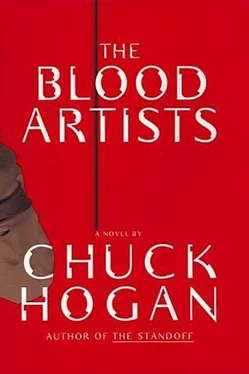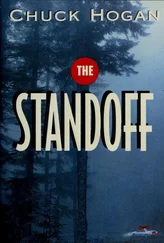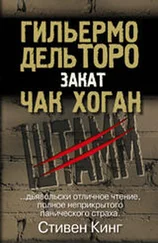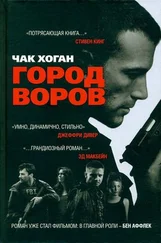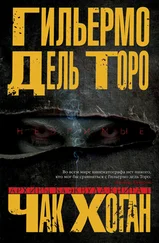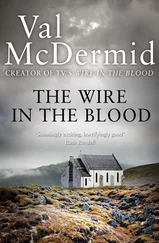Down the corridor and away from the others I found an examining room with a scrub room inside. I locked the inside door and the light over the sink blinked on, harsh and suddenly blue to my eyes. I turned on the sink faucet. I broke open my warmed suit one-handedly and shrugged off the shoulders and hood, freeing my left arm. There was no blood visible through the gloves. I snapped off the first layer, then the second, and withheld my bare left hand. Still no blood, and no visible breach. I gripped it by the wrist, palm up under the light, and searched for a hole, close enough to see the faint mound of beating pulse in the center of the scoop of my palm. With growing relief, I pressed down on the area with the thumb of my right hand. A single drop of blood squeezed out.
I shoved my hand under the water. It was cold. I needed it hot. Friction was imperative and I rubbed and squeezed at my hand as the water scalded and the sink began to smoke. I forced my hand to bleed. I pulled and prodded at my flesh, trying to open up the meat of the wound in order to irrigate it. I found a bottle of soap and pumped some clear gel into my palm. There was a low-grade antiseptic cleanser on the countertop and I pulled the sink trap and sloshed the green solution into the steel bowl. I thrust my hand into it and expected it to burn, hoped that it would burn. But it did not. I found a scrub brush and scraped at my palm until it was raw.
I pulled out my hand. I slicked away the excess liquid and again held the dripping, reddened palm to the light. In doing so, I caught the reflection of my face in the steamed mirror and was stunned by its look of terror. I moved closer and examined my staring eyes. Wide and unblinking, a thin orbit of blue circling the dilated black. I knew exactly what was happening. The locus ceruleus, a cluster of nerve cells that is the control center of the brain, responds to stress by releasing hormones that activate the hypothalamus, which in turn triggers the pituitary gland to release adrenocorticotrophic hormones into the bloodstream, which then make their way into the kidneys, which respond by spewing out adrenaline — all of which causes the eyes to dilate, the blood vessels to open wider for increased blood flow, and the heart to pump faster.
It gets into your palm; you could cut off your hand but it’s already in your arm; you could cut off your arm but it’s already pumping through your shoulder and circulating down into your heart, flooding into the spleen, the liver, the brain. My own body was facilitating the infective process and revolting against me. I felt a gag deep in my throat as though a hand had reached up from my stomach and pulled. I pitched forward with an awful groan and vomited into the sink.
I cleared the trap with my right hand and the sink basin drained. I straightened, choking, one hand gripping the sink edge, the other flat against the wall beside the mirror, holding me up. But then a cooling sensation spread from my spine outward, a sudden, bracing chill of realization, the muscles of my back softening as I faced myself again in the glass of the mirror. I was well acquainted with the horror stories of doctors who imagined themselves into getting sick, and immediately I regained my breath, coughing up a burst of nervous laughter. That passed, and I was sober once again. I washed my face, blotting the sweat from my brow with a paper towel, then wrapped my bleeding hand in a tight gauze cushion. I looked down at the four gloves lying discarded on the floor like pate, strangled birds, and at once disposed of them in biohazard, pulling on two fresh pairs, gathering my suit up around me from the waist and sealing myself back inside. I cleaned the floor and the sink, replaced the soap bottle and the empty jug of antiseptic cleanser, then unlocked the scrub room door and emerged.
I returned to the green zone. The second door opened onto the trauma unit, and my anxiety began again immediately. I needed to see the patient in bay twenty-six. I needed to speak with him, for my own sanity, feeling somehow that he had something to say to me. I found the gaudy curtain pulled aside as I had left it, the tent zipper undone, the Unoccupied sticker peeking out from the bed rail chart.
The bed was empty. The patient was gone. I felt panic welling up, and whirled around to check the adjoining bays.
“Dr. Pearse.”
It was Tenney approaching, carrying a printout. “Have they taken any patients out of here?” I asked him.
He was startled. “I wouldn’t know, Dr. Pearse—”
“How long was I gone just now?”
“I wouldn’t know, sir. You sent me out.”
I noticed two patients laid out on gurneys in front of the air lock and hurried over to them. One was an advanced case inside an oxygen tent, a middle-aged woman, her palsied face locked in agony. A black rubber body bag lay on the other gurney. I seized the zipper, pausing a moment for confidence, then quickly drew it down. The seam opened on the wasted, staring corpse of an elderly black man.
I backed away. “How many others have you taken out?” I said to the woman who was attending them.
“None, sir,” she said through her hood. “None myself.”
“Then there were others?”
“Maybe, Dr. Pearse. A few.”
I returned to twenty-six. I drew the hanging curtain around the bay, closing myself off from the prying eyes of Tenney and the rest, and looked at the shrouded bed. I tore aside the plastic tent opening near the cart The bed linen had been shucked down to the foot of the mattress and I gathered the sheet and blanket in my hands, but my rubber gloves prevented me from feeling any warmth. I shook each out separately, looking for the blood-filled syringe I had dropped there, then pulled up the mattress. I searched beneath the bed and broke apart the plastic biohazard box. I checked the sheet, the blanket, the mattress, the apple green floor for drops of blood. Nothing.
He had disappeared. I backed away to the curtain, stopping there to regroup.
The patient had just awoke from long-term catatonia. He would have had little if any manual coordination, and therefore simply could not have bumped my arm with the intention of infecting me. The entire event was beyond reason. The absence of any admittance records was another mystifying piece of evidence. I had seen people go to pieces inside a contact suit before. Maybe I had imagined the entire thing.
I managed to convince myself of this, even as I knew it was not true. I was trusting that the patient in bay twenty-six was just that, a patient, and not an assassin dispatched in the same way a killer T cell is dispatched to an invading force. Only later would the greater irony be revealed: that this assassin had in fact collected two debts that day, one for Africa, and the other, unwittingly, for himself.
But for now I turned and drew the curtain open again, baring the bay to the rest of the room, telling myself that there was nothing to hide. I crossed the trauma unit back to the air lock with all eyes on me until the bolts clicked again and I was alone, the blue lamps humming brightly and easing the echoes of panic left in my head. Relieved, concerned, mystified: I didn’t know what I felt. All I knew was that I was getting away. I stood waiting with my head hung low in the sterile chamber between death and life.
The rest is shameful but I shall tell it anyway.
I returned to Atlanta that evening, traveling home from the airport by taxi. I owned a house in Sandy Springs, just north of the city, a stately five-bedroom brick colonial set upon an incline, overlooking a labyrinthine community of variations upon the same brick colonial. I disarmed the alarm and went upstairs without switching on any of the lights, sitting down at the foot of my bed, relieved and happy to be finally home. Outside the window, trees shifted against the blue-black sky.
Читать дальше
